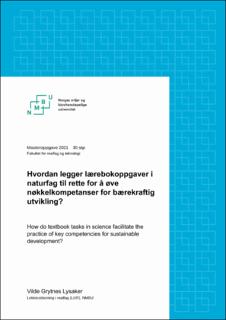| dc.contributor.advisor | Bjønness, Birgitte | |
| dc.contributor.author | Lysaker, Vilde Grytnes | |
| dc.coverage.spatial | Norway | en_US |
| dc.date.accessioned | 2021-10-28T11:29:40Z | |
| dc.date.available | 2021-10-28T11:29:40Z | |
| dc.date.issued | 2021 | |
| dc.identifier.uri | https://hdl.handle.net/11250/2826294 | |
| dc.description.abstract | Høsten 2020 ble Fagfornyelsen (LK20) implementert i norske skoler, der det tverrfaglige temaet bærekraftig utvikling er en viktig del av både kompetansemål og den overordnede delen. I forbindelse med innføringen av Fagfornyelsen utga lærebokforlagene nye lærebøker, og det var i den sammenheng interessant å undersøke hvordan de nye naturfagslærebøkene legger til rette for temaet bærekraftig utvikling. Lærebøker og lærebokoppgaver er hevdet å spille en sentral rolle i undervisningen og underbygger dermed relevansen av en lærebokanalyse. Masteroppgaven er avgrenset ved å undersøke hvordan lærebokoppgaver legger til rette for å øve kompetanser ansett som viktige for bærekraftig utvikling, omtalt som nøkkelkompetanser for bærekraftig utvikling. Forskningsspørsmålet for masteroppgaven er derved:
«Hvordan legger lærebokoppgaver i naturfag til rette for å øve nøkkelkompetanser for bærekraftig utvikling?»
For å besvare forskningsspørsmålet ble det gjennomført en kvalitativ innholdsanalyse av lærebokoppgavene i naturfagslærebøkene Naturfag SF og Kosmos SF. Analysen omfattet 1949 lærebokoppgaver, som ble kategorisert basert på hvilke nøkkelkompetanser for bærekraftig utvikling de legger til rette for å øve. I litteraturen eksisterer det flere forslag til nøkkelkompetanser, men denne masteroppgaven tar kun utgangspunkt i kompetansene benyttet av UNESCO, følgelig: systemtenkningskompetanse, forventningskompetanse, normativ kompetanse, strategisk kompetanse, samarbeidskompetanse, kritisk tenkning kompetanse, selvbevissthetskompetanse og integrert problemløsningskompetanse.
Funnene fra analysen viser at de ulike nøkkelkompetansene i varierende grad er støttet av lærebokoppgavene i Naturfag SF og Kosmos SF. Andelen oppgaver som legger til rette for å øve de enkelte nøkkelkompetansene er relativt lik i de to analyserte naturfagslærebøkene. Systemtenkningskompetanse og kritisk tenkning kompetanse er godt representert i forhold til de andre nøkkelkompetansene. Lærebokoppgavene har et potensiale til å ytterligere støtte elevenes utvikling av kompetansene, både med hensyn til antall oppgaver og med hensyn til innholdet i oppgavene. | en_US |
| dc.description.abstract | In the autumn of 2020, Fagfornyelsen (LK20) was implemented in Norwegian schools, and the interdisciplinary theme of sustainable development became an important part of both competence goals and the overarching part of the curriculum. As a consequence of the introduction of the new curriculum, Norwegian publishers has published new textbooks. In that context it is interesting to examine how the new science textbooks facilitate the theme of sustainable development. Textbooks and textbook tasks are claimed to play a central role in teaching and learning, and thus support the relevance of a textbook analysis. This master thesis is delimited by examining how textbook tasks facilitate the practice of key competencies considered important for sustainable development. The research question for this thesis is thus:
"How do textbook tasks in science facilitate the practice of key competencies for sustainable development?"
In order to answer the research question, a qualitative content analysis was carried out on the textbook tasks in the science textbooks: Naturfag SF and Kosmos SF. The analysis included 1949 textbook tasks, which were categorized based on which key competencies for sustainable development they facilitate. There are several proposals for key competencies in the literature, but this thesis is based on the competencies used by UNESCO (2017): Systems thinking competency, Anticipatory competency, Normative competency, Strategic competency, Collaboration competency, Critical thinking competency, Self-awareness competency and Integrated problem-solving competency.
The findings from the analysis show that the various key competencies are to varying degrees supported by the textbook tasks in Naturfag SF and Kosmos SF. The proportion of textbook tasks that facilitate the practice of the individual key competencies is relatively similar in the two analyzed science textbooks. System thinking competence and critical thinking competence are well represented compared to the other key competencies. The textbook tasks have the potential to further support the students' development of the competencies, both in terms of the number of tasks and in terms of the content of the textbook tasks. | en_US |
| dc.language.iso | nob | en_US |
| dc.publisher | Norwegian University of Life Sciences, Ås | en_US |
| dc.rights | Attribution-NonCommercial-NoDerivatives 4.0 Internasjonal | * |
| dc.rights.uri | http://creativecommons.org/licenses/by-nc-nd/4.0/deed.no | * |
| dc.title | Hvordan legger lærebokoppgaver i naturfag til rette for å øve nøkkelkompetanser for bærekraftig utvikling? | en_US |
| dc.title.alternative | How do textbook tasks in science facilitate the practice of key competencies for sustainable development? | en_US |
| dc.type | Master thesis | en_US |
| dc.description.localcode | M-LUN | en_US |

